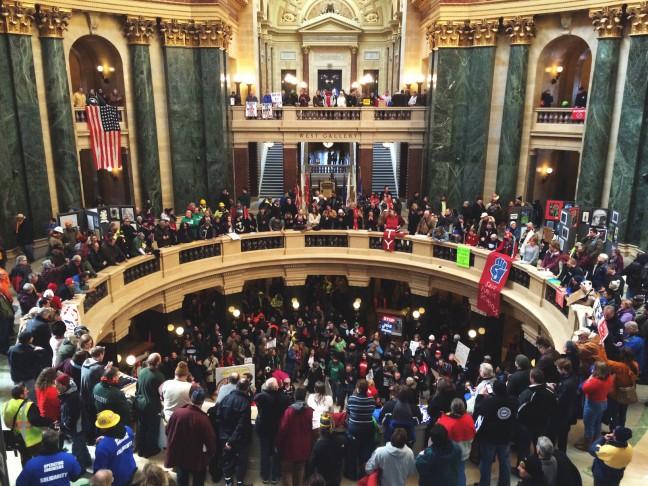The state Senate’s labor committee approved a controversial right-to-work bill Tuesday after eight hours of testimony, sending the bill to the full Senate and bringing almost 2,000 protesters to the state Capitol.
The Senate Committee on Labor and Government Reform approved the bill on a 3-1 party line vote, despite protests and testimony from union backers who gathered at the Capitol. The full Senate will take up the fast-tracked bill on Wednesday, and the Assembly is set to take on the legislation next week.
Right-to-work laws allow workers in unionized workplaces to opt out of paying union fees, which critics say would essentially dismantle private sector unions. If the bill arrives at Gov. Scott Walker’s desk, he will sign it, Walker spokesperson Laurel Patrick said last week.
Wisconsin Senate holds extraordinary session to vote on Right to Work
Senate Majority Leader Scott Fitzgerald, R-Juneau, said at the public hearing that right-to-work laws — which are currently in 24 states — give workers the freedom to choose whether to pay dues to a union they might disagree with and ensure they won’t be penalized for that decision.
“This will be establishing for the first time true workplace freedom here in Wisconsin,” Fitzgerald said.

Scott Manley, the Wisconsin Manufacturers and Commerce vice president of government relations, said a right-to-work law in Wisconsin could bring higher wages and manufacturing growth.
Manley also emphasized Wisconsin’s private sector workers don’t have a choice on whether to pay dues to a union, which could lead to workers who choose not to pay those dues being fired.
“If you don’t support right to work, you stand for the proposition that workers should be fired for not wanting to pay dues to the union,” Manley said.
Economists have disagreed on the effects of right to work laws in states, with both sides of that debate testifying at Tuesday’s committee meeting.
Almost 2,000 union supporters rallied at the Capitol in the afternoon, moving into the rotunda to protest the bill yet not matching the numbers of protesters in 2011, when tens of thousands came to the Capitol to protest the Act 10 law that essentially ended collective bargaining for many public employees.
Cindy Odden of the United Steelworkers of America said people needed to be louder than they were in 2011.
“We have to talk to our fellow Wisconsinites and educate them that this is not just an attack on unions,” Odden said. “This is an attack on all Wisconsin families and we are not going to stand for it.”
The rally was planned by the Wisconisn AFL-CIO and will continue Wednesday, when the full Senate is scheduled to take up the bill. Phil Neuenfeldt, president of the Wisconsin AFL-CIO, said at the rally they were gathered here to “join together in solidarity.”
“Right to work in Wisconsin is not the Wisconsin way,” Neuenfeldt said. “This bill is an attack on all Wisconsin families, it’s an attack on our paychecks, it’s an attack in our ability to put food on the table and a roof over our head and it’s an attack on our rights as workers.”



















